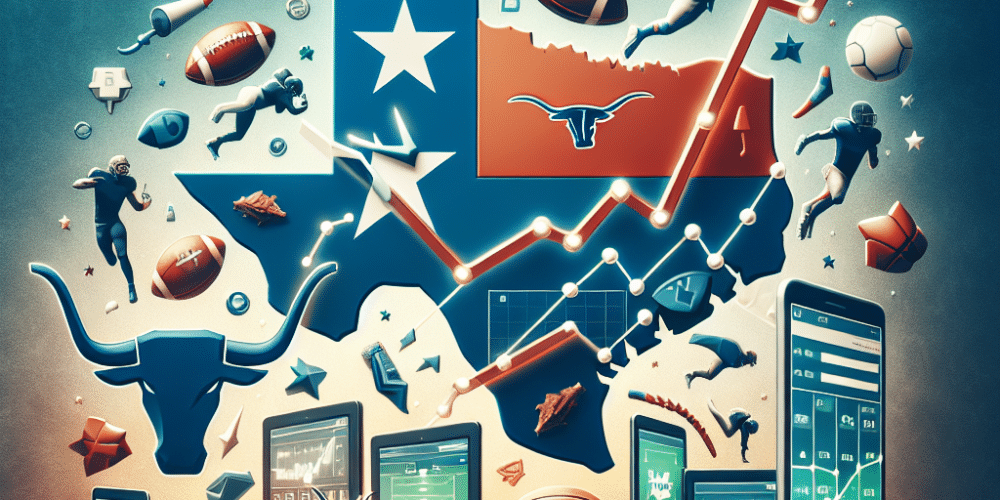On August 23, the NCAA College Football season kicked off, followed by the NFL on September 4, leading to a notable increase in advertisements for gambling apps. To many people’s surprise, Texans found themselves inundated with these promotions, despite no new laws being passed this year to legalize sports betting in the state.
The Texas Tribune reports that the lack of new regulations hasn’t stopped prediction markets from aggressively advertising sports betting in Texas, claiming legality in the Lone Star State. For example, Polymarket’s advertisements assert that “football trading is now legal” in Texas, while Kalshi’s Instagram campaigns suggest, “I found a way to bet on the NFL even though we live in Texas.”
These platforms, in conjunction with daily fantasy sports (DFS), provide alternatives to traditional sportsbooks, enabling Texans to place wagers without technically violating state laws. The key lies in the fact that these services operate under federal regulations rather than state gambling statutes. Prediction markets are treated as financial transactions under the Commodity Futures Trading Commission’s oversight, while DFS games are classified as skill-based contests.
Despite repeated legislative efforts to clarify the regulations surrounding DFS and sports gambling, the legal framework remains ambiguous. Texans, however, can easily access these services online, with DFS and prediction markets facilitating peer-to-peer wagering instead of betting against a traditional house.
Kalshi’s head of media operations, Jack Such, noted that individuals often find ways to gamble regardless of state laws, pointing out that in places like California and Texas, where sports betting remains illegal, “most people will just go to an offshore book instead.”
Such defended the language used in their advertisements, arguing that terms like “bet, trade, invest, gamble” are largely semantic, implying that they all essentially refer to similar activities.
Industry experts, however, suggest that despite operators’ claims to the contrary, these offerings mirror traditional sports betting. Gregory Gemignani, a gaming law professor at UNLV, characterized DFS and prediction markets as “pretty much identical” to traditional wagering, combining elements of fantasy sports or futures trading with gambling mechanisms.
The popularity of prediction markets surged during the 2024 presidential election, with apps allowing users to place “event contracts.” These contracts enable participants to bet on yes/no outcomes, covering a range of events from NFL matchups to political contests.
Tarek Mansour, CEO of Kalshi, reported an impressive $441 million in trades within just four days of the NFL season’s start, drawing a parallel between NFL week 1 and a US election in terms of betting activity.
DFS games work similarly, allowing users to create lineups of two or more athletes and wager on their performance in short-term contests. Operators emphasize that these games are skill-based, offer peer-to-peer experiences, and are therefore exempt from federal gambling prohibitions.
Despite weak enforcement by state authorities, Texans can freely access these alternatives. Meanwhile, lawmakers continue to target other forms of online gambling, such as lottery ticket courier apps. Rep. César Blanco has reiterated the need for clearer regulations to remove these options from their gray area, offering better player protection and curbing illegal offshore betting.
However, not everyone agrees with the expansion of these betting practices. Critics argue that the rise of DFS and prediction markets might inadvertently encourage gambling addiction and financial irresponsibility among participants. They stress the importance of consumer protection measures and urge for more robust regulatory oversight to ensure responsible gambling behaviors.
Conversely, supporters of DFS and prediction markets contend that the focus should be on the educational aspect, providing players with adequate resources to understand the risks and rewards involved. They argue that these platforms offer entertainment and can be managed responsibly by informed individuals.
The broader context of the U.S. gambling industry reveals an ongoing tug-of-war between regulation and innovation. States like New Jersey and Pennsylvania have embraced regulated sports betting, reaping significant tax revenues. Texas, on the other hand, remains a significant market with untapped potential, fueling debate on whether embracing regulation could similarly bolster the state’s economy.
As the football season progresses, the debate over sports betting in Texas continues. Will the state eventually embrace regulation, or will Texans keep navigating the gray areas of DFS and prediction markets? The answer may lie in balancing innovation with regulation to protect consumers while tapping into the lucrative potential of sports betting.

David Garato is a luminary in gaming journalism, renowned for peeling back the curtain on the gaming world with his witty and insightful commentary. A decade into weaving stories from the pixelated edges of indie games to the expansive universes of AAA titles, David’s work is a thrilling blend of analysis and adventure. When not writing, he’s live-streaming, sharing his gaming exploits with an engaged and growing audience. David doesn’t just write about games; he lives them, making him a trusted guide in the gaming community.
















